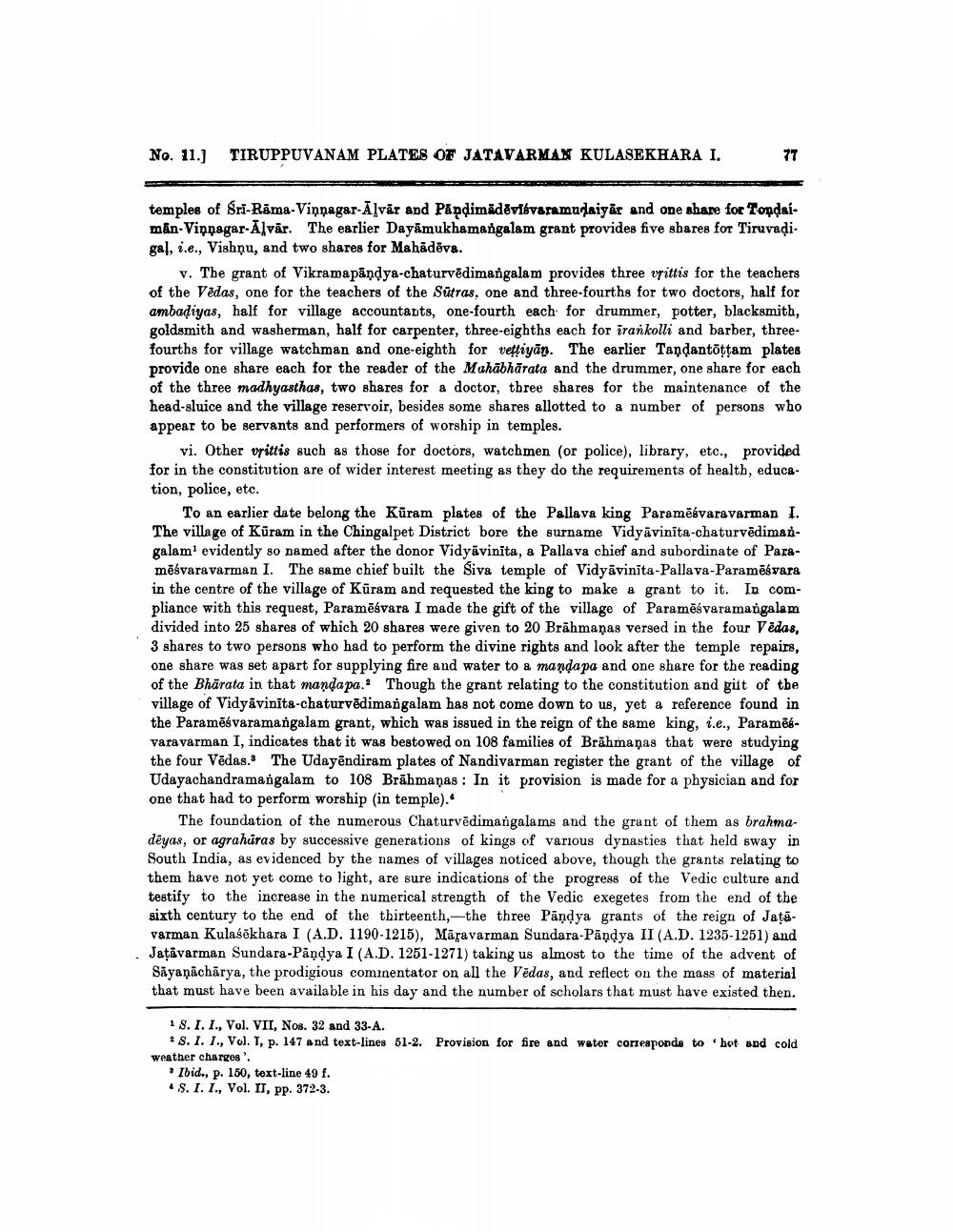________________
No. 11.)
TIRUPPUVANAM PLATES OF JATAVARMAN KULASEKHARA I.
temples of Sri-Rāma-Viņņagar-Aļvār and Pandimadeviávaramudaiyār and one share for Tondaimân-Viņpagar-Alvār. The earlier Dayāmukhamangalam grant provides five shares for Tiruvadigal, i.e., Vishņu, and two shares for Mahādēva.
v. The grant of Vikramapāndya-chaturvēdimangalam provides three yrittis for the teachers of the Vedas, one for the teachers of the Sūtras, one and three-fourths for two doctors, half for ambadiyas, half for village accountants, one-fourth each for drummer, potter, blacksmith, goldsmith and washerman, half for carpenter, three-eighths each for irankolli and barber, threefourths for village watchman and one-eighth for vettiyān. The earlier Tandantottam plates provide one share each for the reader of the Mahābhārata and the drummer, one share for each of the three madhyasthas, two shares for a doctor, three shares for the maintenance of the head-sluice and the village reservoir, besides some shares allotted to a number of persons who appear to be servants and performers of worship in temples.
vi. Other vrittis such as those for doctors, watchmen (or police), library, etc., provided for in the constitution are of wider interest meeting as they do the requirements of health, education, police, etc.
To an earlier date belong the Küram plates of the Pallava king Paramēávaravarman 1. The village of Küram in the Chingalpet District bore the surname Vidyāvinita-chaturvēdimangalam evidently so named after the donor Vidyāvinīta, a Pallava chief and subordinate of Paramēsvaravarman I. The same chief built the Siva temple of Vidyāvinīta-Pallava-Paramēsvara in the centre of the village of Kūram and requested the king to make a grant to it. In compliance with this request, Paramēśvara I made the gift of the village of Paramēśvaramangalam divided into 25 shares of which 20 shares were given to 20 Brāhmaṇas versed in the four Vēdas, 3 shares to two persons who had to perform the divine rights and look after the temple repairs, one share was set apart for supplying fire and water to a mandapa and one share for the reading of the Bhārata in that manda pa. Though the grant relating to the constitution and gift of the village of Vidyāvinīta-chaturvēdimangalam has not come down to us, yet a reference found in the Paramēśvaramangalam grant, which was issued in the reign of the same king, i.e., Paramēsvaravarman I, indicates that it was bestowed on 108 families of Brāhmaṇas that were studying the four Vēdas. The Udayēndiram plates of Nandivarman register the grant of the village of Udayachandramangalam to 108 Brāhmaṇas : In it provision is made for a physician and for one that had to perform worship (in temple).
The foundation of the numerous Chaturvēdimangalams and the grant of them as brahmadeyas, or agrahuras by successive generations of kings of various dynasties that held sway in South India, as evidenced by the names of villages noticed above, though the grants relating to them have not yet come to light, are sure indications of the progress of the Vedic culture and testify to the increase in the numerical strength of the Vedic exegetes from the end of the sixth century to the end of the thirteenth,--the three Pandya grants of the reign of Jatavarman Kulasokhara I (A.D. 1190-1215), Māravarman Sundara-Pāņdya II (A.D. 1235-1251) and Jatavarman Sundara-Pāņdya I (A.D. 1251-1271) taking us almost to the time of the advent of Sāyaṇāchārya, the prodigious commentator on all the Vēdas, and reflect on the mass of material that must have been available in his day and the number of scholars that must have existed then.
hot and cold
18. I. I., Vol. VII, Nos. 32 and 33-A.
2 S. 1. 1., Vol. T, p. 147 and text-lines 51-2. Provision for fire and water corresponde to weather charges'.
Ibid., p. 150, text-line 49 f. * S. I. I., Vol. I, pp. 372-3.




